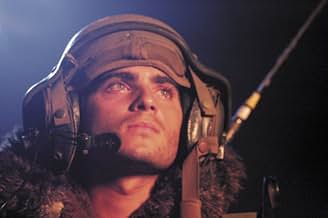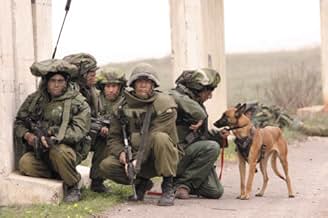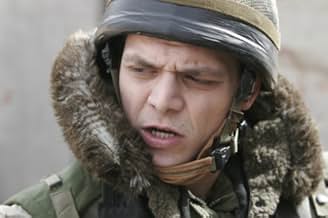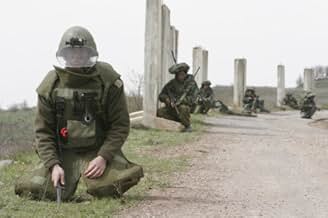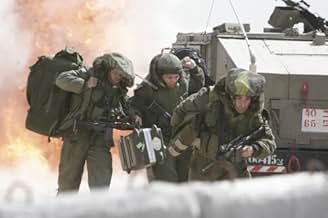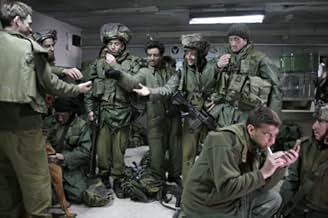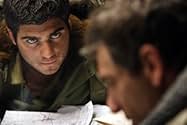Beaufort
- 2007
- Tous publics
- 2h 11min
NOTE IMDb
6,7/10
5 k
MA NOTE
Ajouter une intrigue dans votre langueThe story of a group of Israeli soldiers stationed in an outpost prior to the withdrawal of forces of 2000.The story of a group of Israeli soldiers stationed in an outpost prior to the withdrawal of forces of 2000.The story of a group of Israeli soldiers stationed in an outpost prior to the withdrawal of forces of 2000.
- Réalisation
- Scénario
- Casting principal
- Nommé pour 1 Oscar
- 5 victoires et 9 nominations au total
Arthur Perzev
- Yonatan Shpitzer
- (as Arthur Faradjev)
Zohar Strauss
- Rossman
- (as Zohar Shtrauss)
Ya'akov Ahimeir
- Self
- (as Yaakov Ahimeir)
Avis à la une
It's about Israeli soldiers holding down a fort in Southern Lebanon, but it could be about soldiers anywhere. That is what makes this film so memorable.
Lebanon, Afghanistan, Bosnia, Iraq, it is all the same when it comes to politics and the soldiers that have to carry out the policies made by chickenhawks far removed from the front.
It is touching and funny at times. I could really relate to the truck arriving with fresh supplies after a long wait. It is common and a hot meal at midnight is much appreciated when you have been running low.
It shows real soldiers doing real grunt work. It is an outstanding film.
Lebanon, Afghanistan, Bosnia, Iraq, it is all the same when it comes to politics and the soldiers that have to carry out the policies made by chickenhawks far removed from the front.
It is touching and funny at times. I could really relate to the truck arriving with fresh supplies after a long wait. It is common and a hot meal at midnight is much appreciated when you have been running low.
It shows real soldiers doing real grunt work. It is an outstanding film.
10rob68
Beaufort is a remarkable war movie, with a cinematic style that really says something about the war and the situation in which the troops are in. the story is told through the eyes of the main character, Liraz, who's awareness of himself and the nature of the battle he's in gradually deepens into a sharp and original view on war and fear of death. the tension that is created throughout the film is a result not of fast paced action events, but through a series of scenes that takes the viewer into the world of this outpost, with all its claustrophobia, and mixed emotions that include the thrill of danger and numbness toward tragedy, but also simple fear that cannot be overcome. I recommend this movie to everyone.
Beaufort is an impressive israeli movie with fantastic photography and With excellent cast but some of the scenes are stuck and prolonged too Much. Beaufort is a movie that make you look on the other side of the war,of the mental and the physical side of the soldiers.it makes you understand the difficulties,dilemmas and the unbearable fear with some excellent And Impressive action scenes that makes us feel the soldier's situation in the war. This is a movie that can show the world the condition and the position of the Israelis soldiers that know the Israeli-Palestine conflict and can show the human side in the war and not only the wild and savage side.
There aren't any real winners at war but there are real injured and dead soldiers and people.This movie show you.
There aren't any real winners at war but there are real injured and dead soldiers and people.This movie show you.
Considering the sanitized pulp that the United States military participates in the filming of, it is refreshing to see a movie about soldiers that rings true and does not shy away from controversy. The IDF must also be commended for actively participating in the making of a film that does not shine the best light on the occupation of southern Lebanon.
Ultimately it is Israeli politicians and inept commanders that take the brunt of the blame for the appalling conditions the soldiers portrayed in this movie endure while holding on to their mountain top position.
Hezbollah obviously plays a part in this story, yet they are an unseen presence. They are always just out of the frame and sporadically, sometimes shockingly so, they remind everyone involved of their lethal potential.
Set aside your preconceived notions of the Israeli-Arab conflict and see this movie.
Ultimately it is Israeli politicians and inept commanders that take the brunt of the blame for the appalling conditions the soldiers portrayed in this movie endure while holding on to their mountain top position.
Hezbollah obviously plays a part in this story, yet they are an unseen presence. They are always just out of the frame and sporadically, sometimes shockingly so, they remind everyone involved of their lethal potential.
Set aside your preconceived notions of the Israeli-Arab conflict and see this movie.
I'm not a fan of the war genre, but Beaufort plays out more as a psychological thriller, and I find it hard to fault. There was an amazing blend of naturalism, stylistic devices, humour, touching human drama and suspense - at one time I jumped in my seat like I never have before.
The camera movements and cinematography are excellent and reinforce a sense of claustrophobia as a group of Israeli soldiers keep guard at an historic fort within southern Lebanon, but are virtually under siege by Hezbollah forces. Character development is also excellent with much authenticity. The film focuses on the idiosyncrasies of various characters and how they interact with each other under the circumstances. Respect for the commanding officer is sometimes lacking, resulting in a lack of discipline and friction at a difficult time.
I count this film as one of my favourite films in the genre, kind of a cross between Stanley Kubrick's Full Metal Jacket and Sam Mendes' Jarhead, and as good as either of these. Like these two films, there is an understated political critique in how young men are pawns in the games played by those who live comfortably away from the field of battle and death. Whether you like war films or not, this is must-see cinema.
I saw the film's screening at the Melbourne International Film Festival.
The camera movements and cinematography are excellent and reinforce a sense of claustrophobia as a group of Israeli soldiers keep guard at an historic fort within southern Lebanon, but are virtually under siege by Hezbollah forces. Character development is also excellent with much authenticity. The film focuses on the idiosyncrasies of various characters and how they interact with each other under the circumstances. Respect for the commanding officer is sometimes lacking, resulting in a lack of discipline and friction at a difficult time.
I count this film as one of my favourite films in the genre, kind of a cross between Stanley Kubrick's Full Metal Jacket and Sam Mendes' Jarhead, and as good as either of these. Like these two films, there is an understated political critique in how young men are pawns in the games played by those who live comfortably away from the field of battle and death. Whether you like war films or not, this is must-see cinema.
I saw the film's screening at the Melbourne International Film Festival.
Le saviez-vous
- AnecdotesThe lead actor, Oshri Cohen (Liraz), did not serve on the IDF (Israeli Defence Force).
- ConnexionsFeatured in The 80th Annual Academy Awards (2008)
Meilleurs choix
Connectez-vous pour évaluer et suivre la liste de favoris afin de recevoir des recommandations personnalisées
- How long is Beaufort?Alimenté par Alexa
Détails
- Date de sortie
- Pays d’origine
- Sites officiels
- Langue
- Aussi connu sous le nom de
- Thị Trấn Beaufort
- Lieux de tournage
- Sociétés de production
- Voir plus de crédits d'entreprise sur IMDbPro
Box-office
- Budget
- 2 500 000 $US (estimé)
- Montant brut aux États-Unis et au Canada
- 102 591 $US
- Week-end de sortie aux États-Unis et au Canada
- 6 808 $US
- 20 janv. 2008
- Montant brut mondial
- 271 340 $US
- Durée
- 2h 11min(131 min)
- Couleur
- Mixage
- Rapport de forme
- 2.35 : 1
Contribuer à cette page
Suggérer une modification ou ajouter du contenu manquant

